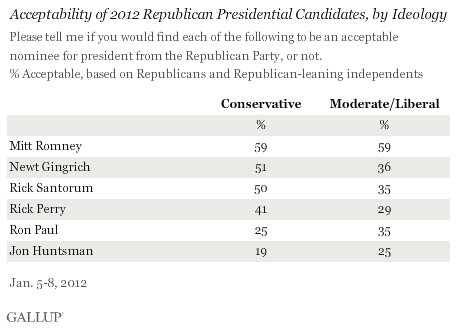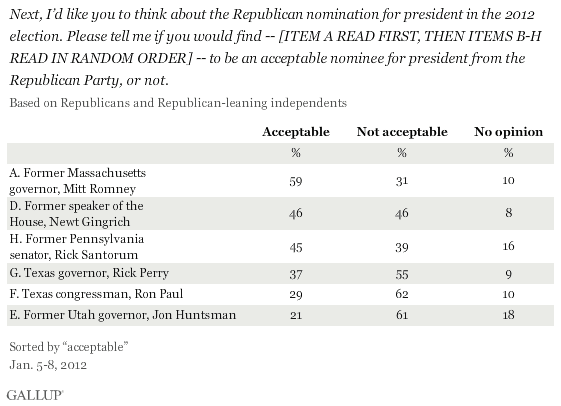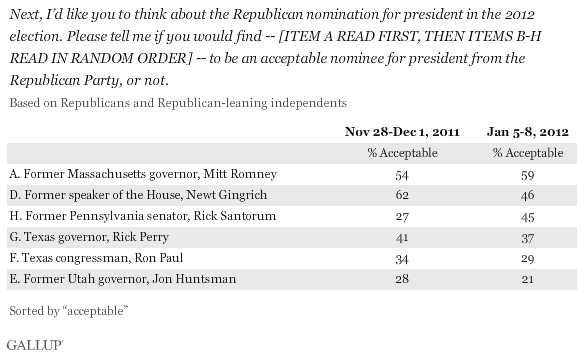PRINCETON, NJ -- Mitt Romney is now the only candidate that a majority of conservative and moderate/liberal Republicans nationwide see as an "acceptable" GOP nominee for president. Conservative Republicans are more likely to say Romney would be an acceptable nominee than either Newt Gingrich or Rick Santorum.

Fewer than half of conservative Republicans see Rick Perry, Ron Paul, or Jon Huntsman as acceptable nominees.
Romney's broad acceptability across ideological lines is decidedly not the case for his competitors. Conservative Republicans view Gingrich, Santorum, and Perry as more acceptable than do moderate/liberal Republicans. On the other hand, moderate/liberal Republicans on average view Paul and Huntsman as more acceptable than conservatives.
Romney Now Only Candidate That Majority of All GOP Says Is "Acceptable"
Fifty-nine percent of all Republicans nationwide perceive that Romney is an acceptable GOP nominee for president, the only candidate with majority support on this measure. Slightly less than half say Gingrich (46%) or Santorum (45%) would be acceptable, while a majority of Republicans say that the three remaining candidates -- Perry, Paul, and Huntsman -- would be unacceptable as their party's nominee.

Santorum Up, Gingrich Down as Acceptable Candidates
Republicans' views of the acceptability of Santorum have risen, while their views of the acceptability of Gingrich have declined since Gallup last asked Republicans this question in a Nov. 28-Dec. 1 survey.
These changes in part mirror the shifts in the relative positioning of these two candidates in terms of Republicans' support. Gingrich was the GOP leader in early December, but has fallen substantially since. Santorum has moved steadily up in Gallup Daily tracking in recent weeks, even before his strong showing in the Jan. 3 Iowa caucuses.

In late November and early December, Republicans saw Gingrich as the most acceptable candidate of any tested, besting Romney on this measure by 62% to 54%. Santorum was acceptable to 27% of Republicans in the previous poll, and he is now acceptable to 45%. Romney's acceptability has edged up slightly over the past month.
Implications
At the national level, Romney is in a strong front-runner position across several measures. He has broken the 30% barrier in terms of national support for the GOP nomination and leads his nearest competitor by 12 percentage points. About 6 in 10 Republicans say they expect he will be their nominee regardless of whom they personally support, and Romney is the only candidate that a majority of conservative and moderate/liberal Republicans see as an acceptable nominee.
Gallup obtained all of these measures in the period between Romney's narrow victory in the Iowa caucuses and the Jan. 10 New Hampshire primary, which he is expected to win. The history of all three of these measures shows that Republican candidates' standings have changed significantly as the campaign has progressed. A little more than a month ago Gingrich was leading in national support and acceptability, and almost as many Republicans expected him to win as thought Romney would win the nomination. Santorum was very low in polling on all measures at that time.
It is possible that if Romney has a worse-than-expected showing in New Hampshire Tuesday night, and if he does not do well in South Carolina on Jan. 21, his national standing could suffer. Currently, however, Gallup's updated measures of support, expectations, and acceptability show that Romney is decidedly the front-runner at the national level.
Survey Methods
Results for this Gallup poll are based on telephone interviews conducted Jan. 5-8, 2012, with a random sample of 479 Republican and Republican-leaning independents, aged 18 and older, living in all 50 U.S. states and the District of Columbia.
For results based on the total sample of Republicans and Republican-leaning independents, one can say with 95% confidence that the maximum margin of sampling error is ±6 percentage points.
Interviews are conducted with respondents on landline telephones and cellular phones, with interviews conducted in Spanish for respondents who are primarily Spanish-speaking. Each sample includes a minimum quota of 400 cell phone respondents and 600 landline respondents per 1,000 national adults, with additional minimum quotas among landline respondents by region. Landline telephone numbers are chosen at random among listed telephone numbers. Cell phone numbers are selected using random-digit-dial methods. Landline respondents are chosen at random within each household on the basis of which member had the most recent birthday.
Samples are weighted by gender, age, race, Hispanic ethnicity, education, region, adults in the household, and phone status (cell phone only/landline only/both, cell phone mostly, and having an unlisted landline number). Demographic weighting targets are based on the March 2011 Current Population Survey figures for the aged 18 and older non-institutionalized population living in U.S. telephone households. All reported margins of sampling error include the computed design effects for weighting and sample design.
In addition to sampling error, question wording and practical difficulties in conducting surveys can introduce error or bias into the findings of public opinion polls.
View methodology, full question results, and trend data.
For more details on Gallup's polling methodology, visit www.gallup.com.
